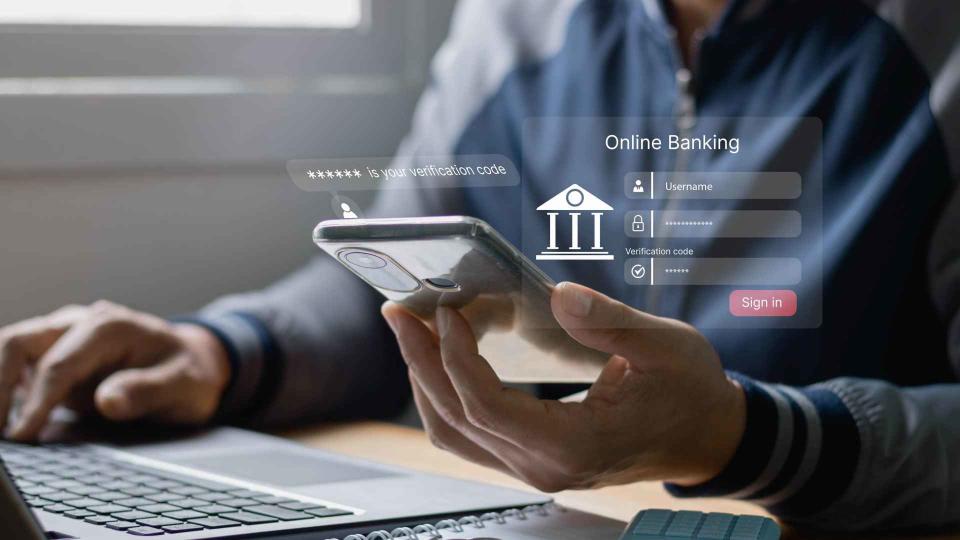3 Common Myths About Online Banks

You might hesitate to consider opening an online account because of the misinformation about them. Similar to traditional banking, online banks have their pros and cons. Knowing some of these myths helps you make an informed decision about whether they’re right for you.
“Online banks differ from traditional banks primarily in their lack of physical branches,” said Dennis Shirshikov, head of growth at GoSummer and finance professor at the City University of New York.
This absence allows online banks to reduce overhead costs significantly, enabling them to offer higher interest rates on savings accounts and lower fees on other services.
Explore More: 10 Valuable Stocks That Could Be the Next Apple or Amazon
Find Out: 6 Subtly Genius Things All Wealthy People Do With Their Money
“For example, many online banks provide fee-free checking accounts and higher-yield savings accounts compared to their brick-and-mortar counterparts.”
Another key difference, according to Shirshikov, is the emphasis on digital innovation.
“Online banks often lead the way in offering advanced mobile banking apps, user-friendly interfaces, and seamless integration with financial tools.”
This focus on technology can make banking more convenient and accessible for tech-savvy customers. Below, experts dispel some common myths about online banking, as well as the pros and cons.
Myth: Online Banks Aren’t Secure
One prevalent myth about online banks is that they are less secure than traditional banks.
“In reality, online banks often employ cutting-edge security measures, such as multi-factor authentication, end-to-end encryption, and regular security audits,” Shirshikov said.
Trending Now: 10 Things You Should Do When Your Child’s 529 Account Reaches $20,000
These measures, he explained, are designed to protect customer data and prevent unauthorized access. According to Justin Godur, finance advisor and founder of Capital Max, the real security risk lies not within the banks but in user practices.
“Such as the management of personal passwords and awareness of phishing attempts,” Godur said.
Myth: They Have Inferior Customer Service
“Another common misconception is that online banks offer inferior customer service,” Shirshikov said.
While online banks don’t have physical branches, he said they often provide 24/7 customer support through various channels, like phone, email and chat.
“For instance, an online bank like Ally Bank is known for its excellent customer service ratings, despite having no physical locations.”
Godur agreed, noting this works as a benefit.
“This can offer a more accessible and responsive customer service experience compared to traditional banks, which are bound by branch operating hours.”
Myth: Online Banks Are Only For The Tech Savvy
“There’s also a myth that online banking is only for the tech-savvy,” said Godur.
He explained that modern online banking platforms are designed for ease of use, catering to customers across all ages and tech experience levels.
“The interfaces are intuitive, guiding users through their banking needs with simplicity and efficiency.”
Pros Of Online Banking
According to Shirshikov, the pros of online banks include lower fees, higher interest rates, and greater convenience.
“Without the overhead of maintaining physical branches, online banks can pass on the savings to customers in the form of better rates and fewer fees,” Shirshikov said.
Additionally, he said the ability to conduct all banking activities online or through a mobile app provides unparalleled convenience, especially for those who prefer digital interactions. In discussing the advantages, Godur equally noted that online banks typically offer higher interest rates and lower fees due to the lack of physical branches and the associated costs.
“The convenience of managing finances from anywhere at any time appeals to a mobile-first generation, aligning with contemporary lifestyles that prioritize flexibility and efficiency,” Shirshikov said.
Cons of Online Banking
On the flip side, experts agree that the main drawback of online banks is the absence of in-person services, critical factors for those who prefer face-to-face interactions for their banking needs.
Additionally, Godur said the reliance on technology means that access is contingent upon having a stable internet connection, which might be a hurdle in less connected areas.
Shirshikov also noted that the lack of physical branches disadvantages customers who prefer face-to-face interactions or need in-person services, like depositing cash or getting a certified check.
“While online banks typically offer robust customer support, the absence of a local branch might be a drawback for those who value the personal touch of traditional banking,” Godur said.
The Bottom Line
Overall, online banks provide a compelling alternative to traditional banking by addressing the modern consumer’s need for convenience, efficiency, and enhanced financial benefits.
“Understanding these aspects helps individuals make informed decisions that best suit their banking preferences and lifestyle,” Godur said.
More From GOBankingRates
This article originally appeared on GOBankingRates.com: 3 Common Myths About Online Banks

 Yahoo Finance
Yahoo Finance 